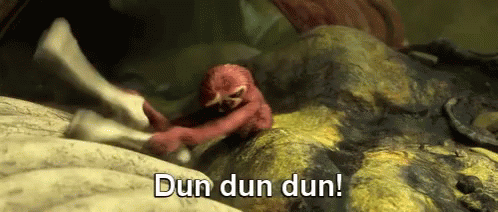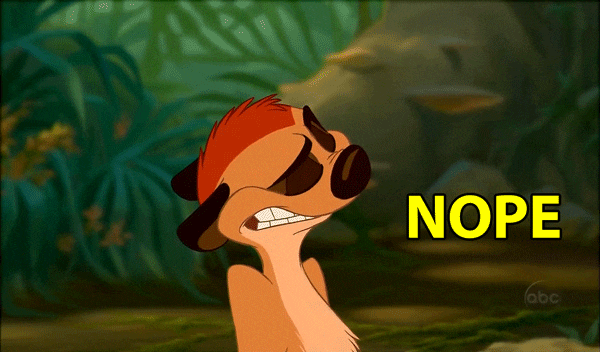Millennials have a reputation in the news for being notoriously murderous, but to be honest, I don't usually pay much attention to the kill list du jour. This week, however, several iterations of an article popped up on my feed that all talked about my generation's latest victim: The fairy tale.
Things just got personal.
First up, the articles. The original "poll" of 2000 parents was published on the MusicMagpie blog, with the title "Are fairytales outdated and offensive?". This was soon picked up by a very telling (heh) assortment of news outlets with titles such as "Snowflake parents are censoring fairytale storylines to make them more PC" and "Outdated and offensive?" and "Millions of parents 'CHANGE the endings of classic fairytales because they are politically incorrect'". The poll and the implications came in handy for several sources that like to conflate the natural evolution of the oral tradition with panic about "political correctness."
So. Let's set a few things straight.
1. Folktales and fairy tales are NOT the same thing.
Folktale means a story comes from the oral tradition (as in, told by teh folk). Fairy tale is a type of tale that features magical elements. Some fairy tales are folktales, and some are literary tales (as in, they have an author). The line between the two is not always clear, but that's the general idea.
Why is this important?
Well, because
2. Folktales have VARIANTS.
That means, they have been told, and are being told, in many places by many people in many, vastly different ways. Claiming that one story is "right" or "wrong" just shows that the person critiquing has never really read or heard any other version.
Why is this important?
Well, because
3. Folktales have ALWAYS CHANGED.
They have been changing for centuries. They change with every telling. They have changed so much between each edition of the Grimm collection that you'd barely recognize the first version (Did you know that there are TWO wolves in Little Red Riding Hood? Or that Rapunzel gets pregnant and left in the tower? Or that Snow White is persecuted by her own mother?). What a story looks and sounds like depends on how far back you want to go. Like, shall we go all the way back to when the Dancing Princesses were wine-crazed followers of Bacchus who had to be exorcised by a priest?
Why is this important?
Well, because
4. You are free to CHANGE the tale, or PICK a version you like.
Because oral tradition works like that.
For example: If you have problems with non-consensual kissing in Sleeping Beauty (or, going back further, the fact that the prince gets the sleeping Talia pregnant, and then leaves her until she wakes up while giving birth) - you can just pick a motif that works better for you.
Folktale motifs are like LEGO blocks for stories. You can mix and match them. For example, there are several Sleeping Beauty variants where the princess is woken up when a prince (in some cases, another princess) pulls the magic splinter from her hand. Or there are tales from a related type (Water of Life) in which the sleeping princess is about to be attacked by a snake, so the prince kills the snake, and that breaks the curse.
There is no one single right way to tell it. There are several.
Why is this important?
Well, because
5. Some story motifs (or entire stories) DO GET OUTDATED.
The big mistake of the article (and the poll) is that it does not make a distinction between necessary (and natural) changes for social values, and changes that result from people misunderstanding how folktales work.
Take the Lazy Cat, for example. It is a traditional Hungarian folktale that used to be wildly popular. It is about how a man teaches his wife to be a good, hard-working woman by repeatedly beating her bloody with a whip. Eventually, she learns. The end.
Traditional? Yes. Should we tell it to kids?
But this is only half of the issue.
The other half is that
6. Our understanding of violence CHANGES as we grow up.
When kids hear Little Red Riding Hood, they don't imagine a scene from Game of Thrones. It is clear from the story that Red gets to be swallowed in one cartoonish gulp, since she is rescued in one piece later. As a practicing storyteller for more than 10 years, I can tell you this: The only complaint I have ever received from kids about folktale violence is that it should have been bloodier. Death in fairy tale symbolism means absolute closure. The wolf needs to die, or the kid will have nightmares, not from the belly-cutting, but from the fear that it might come back.
But this is still only part of the issue.
Because
7. Storytelling DOES NOT WORK WITHOUT CONTEXT.
If we really are focusing on parents telling bedtime stories, here is the big solution: TALK TO YOUR KIDS. Ask them what they think. Listen to what they say. If they tell you they are scared of the wolf, then tell something else. Or even better, ask them why they are scared. Talk about wolves. Look at pictures. Draw pictures. Discuss. Bedtime stories are not supposed to do the heavy lifting.
WHEW.
Okay, now, just for funsies, let's look at the "worst offenders" in that poll.
"36% are concerned by the Pied Piper of Hamlin tricking children into following him."
You know who else is very concerned about that? The parents who didn't pay the piper.
(There is a moral to this story, you see)
Also, this is neither folktale, nor fairy tale. This is a local historical legend.
"Almost one in four disagree with Cinderella doing all the cleaning and chores."
You know who else disagrees with this? THE AUDIENCE. That is why they love the part of the story where she doesn't have to do that anymore. You know, the ending?
"27% think Robin Hood is a terrible role model, despite giving back to the poor."
People need to learn the magical phrase of "you know, back in those days..." and read up on feudalism.
"A quarter think The Ugly Duckling could encourage body-shaming and discrimination."
Again, not a folktale, and also not a particularly great story. But I'll play. Here is your reading comprehension test: What does the ending of this tale say about bullying ugly ducklings?
"One in four think Sleeping Beauty is problematic due to Prince Charming not asking for consent before kissing the princess."
See No. 4 above.
"3 in 10 dislike Hansel and Gretel as children are left alone in the forest."
You know who else dislikes that? Hansel and Gretel. Oh, and THE AUDIENCE.
"Little Red Riding Hood , for example, ends with a little girl being eaten by a wolf then cut out of said wolf’s stomach by a hunter with an axe."
Little Red is kind of a crap story. That is probably why I have been halfway around the world, read a couple of thousand folktales, I found no variants of it. For other concerns, see Numbers 6 and 7.
Oh, and as for millennials: We just grew up on Disney movies. It's not like we made them.
(***Do NOT get me started on how Eurocentirc this whole debate is***)














Love this!
ReplyDeleteExcellent post! Most people these days have been brought up on books of bedtime stories that put together stories from all over and retold them for young children. That’s all they know about the world of folktales/fairy tales. And yes, probably got their versions from Disney as well.
ReplyDeleteNeil Gaiman’s retelling of Hansel and Gretel mentions in an afterword that there were times in the Middle Ages when famines did result in parents abandoning children.
Jim C Hines has a series of novels using fairytale heroines. Talia, after her abuse, is now a top class assassin.
Yes, I did know about the pregnant Rapunzel. I think that’s in most versions,
In my eyes, that is kind if the entire point of Rapunzel. I like to think of it as a tale that warns against abstinence only sex education :D :D
DeleteYes, yes, yes. You said it so well. This issue has bugged me for quite awhile and here it is again. So many recognized source talk as of they are experts but they don't really have the knowledge. You did a great job explaining this! Also, I remember reading The Uses of Enchantment: The Meaning and Importance of Fairy Tales by Bruno Bettelheim
ReplyDeleteIn a lot of these kinds of articles you can see how the writer only knew the Disney or the picture book versions.
DeleteThe Ugly Duckling is actually based on a much older tale called The Eagle Who Thought He Was a Chicken. I tell it to gay and lesbian audiences as a story about the importance of finding your people. All children should hear it.
ReplyDeleteI love that one :)
DeleteThank you for this post. Most people don't seem to realize that there is no fixed canon for the tales themselves. Distinct adaptations (such as Disney movies) sure, but not the tales.
ReplyDeleteThis is so excellent, Csenge! I'm going to use it in Multicultural Folktales class!
ReplyDeleteThank you! :)
DeleteFantastic post. I agree with everything you've said about the need for folktales to evolve and the fact that there is no single correct version. Everyone is hating on millenials these days, sigh.
ReplyDeletePersonally. I like the version of "Cinderella" where her stepsisters are cutting down their feet to fit into the glass slipper.
ReplyDeleteI like the version of Cinderella where she uses a magic portal to steal stuff from the Prince of Portugal, and when he tells her he'll die if she doesn't marry him, she says, "die, then." :D
DeleteI haven’t come across that one, but as you’ll know, the Italian Cinderella is a murderer. She’s talked into killing her first stepmother by her governess, then the governess becomes her second stepmother and Cinders finds she has made a huge mistake!
DeleteI recently read that one too! The one I was referring to is Sicilian.
DeleteI don't know why whoever out there saying millennials are killing things is so gung-ho about it. I wonder if previous generations had to go through this too, but it wasn't as wide spread because of no internet.
ReplyDeleteEnjoyed this!
ReplyDeleteTruly worthwhile reading. Thank you! May I pass it on to a humanities program for high school students?
ReplyDeleteYes, absolutely!
DeleteI haven't seen the poll or the original article, but based on the discussion of this blog, the author(s) of the questions asked about the poll are the main problem. They didn't get #5 [The big mistake of the article (and the poll) is that it does not make a distinction between necessary (and natural) changes for social values, and changes that result from people misunderstanding how folktales work.], they just plain ASKED THE WRONG QUESTIONS, and they definitely MISSED THE WHOLE POINT OF THE STORY!!!!! Maybe we just didn't teach the millenials how to understand a story...
ReplyDeleteIn the 1970's fairy tales were considered as too cruel to be told. I was a father then who was supposed to tell. I can't remember my own father telling fairy tales. Maybe not only millennials are to be blamed??
ReplyDeleteRob Vanderwildt, Antwerp
Glad you tackled this, and may I say in a fabulous fashion!
ReplyDelete